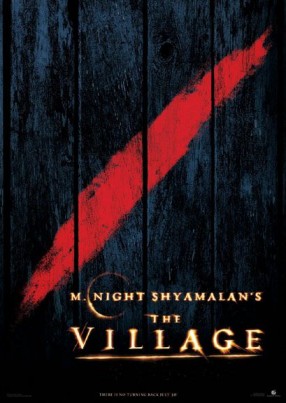That
simple refrain works as a prayer of mourning, a prayer of
blessing and a deceptively clever mantra for the elders
of the village of Covington Woods. For as M. Night Shyamalan
unfolds his tale in The Village, you get a sense
of time running out on these people. It could be the encroaching
twentieth century. It could be the strange spiked creatures
("Those We Don't Speak Of") in the deeper forest that no
longer seem to respect their boundaries and their agreements.
Or it could be that with this writer/director, a wrenching
twist isn't just likely to happen; at this point, he can't
help himself.
Actually,
Shyamalan shows some restraint in his plotting to finally
match the slow elegance of his direction. When the plot
turns come, they do not appear as jolts that suddenly freak
out the audience. Instead, they add levels to our understanding
of the overall story, serving a greater meaning than to
just be clever. As a result, The Village may well
indeed be the best M. Night Shyamalan film.
To
his detractors, that may be faint praise. But Shyamalan
has come closer to balancing his questioning of God and
religion with a populist (yet almost old-fashioned) filmmaking
style than ever before. It may still fall a little short,
but he's getting closer. And hey, at least he's trying to
say something without beating you over the head with
it.
Drawing
from 19th Century literature (a strong streak of Nathaniel
Hawthorne's sensibility runs through the film), Shymalan
has carefully constructed a society removed from American
civilization. Clearly meant to be a puritan social experiment
against the then-modern evils, Covington Woods runs on simple
rules. The village elders govern all important decisions.
Though religion seems to be very important, the day to day
business of living harmoniously takes precedent. All is
well, until Those We Don't Speak Of begin skinning animals
and leaving them as warnings to the villagers.
Warnings
of what? That's part of the growing dread of the film, a
sensation that Shyamalan has proven a master of building.
His direction takes its time, bathing in long pauses and
tense silences. For the first time, his subject matter matches
that style, as these are clearly a repressed people, for
whom every utterance must go through a mental filter to
make it as courtly and inoffensive as possible.
That
filter works almost too well for Lucius (Joaquin Phoenix),
son of Elder Alice Hunt (Sigourney Weaver). The one man
in town with no apparent fear, just a dogged determination
to do what must be done, he burns in silence. In order to
speak before The Elders, Lucius carefully scripts himself.
Even in his awkward tongue, he knows something must be done,
for Covington Woods may be falling apart.
The
village holds secrets, as every home has a locked black
box full of "…the life left behind." It has a sense of entropy,
as the doctor has run out of medicines that could cure simple
illnesses and perhaps help the blind Ivy Walker (Bryce Dallas
Howard) and the village idiot Noah Percy (Adrien Brody).
With Lucius, they form a trinity of characters that will
expose Covington Woods to the truth.
Though
not the greatest of directors for actors, Shyamalan has
a keen casting eye. He uses both Weaver and William Hurt
as Head Elder and schoolteacher Edward Walker to the best
of their strengths and weaknesses as actors. In particular,
the compassion of Hurt, who seems so strange off-screen,
goes a long way to justify many of the plot revelations.
No matter how bizarre Covington Woods comes to seem, Hurt's
performance gives you a way in to understanding how it could
happen with all the best intentions.
In
the ostensible lead, Phoenix makes uneasy silence compelling.
Brody alternates between fun and creepy, as the one character
that seems to welcome incursions by the creatures. The real
find here is Howard (Ron's daughter), a woman of striking
self-confidence and not too obvious beauty. Her role has
the most complexity, and she handles it well.
The
biggest weakness to the film may be in the dialogue. It
has a stiltedness to it that sounds more like how Shyamalan
thinks people in the 19th century spoke than how
it actually was, often veering into parody. Yet he finds
a way to make us accept that over time.
As
well, you may not completely embrace his final twist. It
does take a pretty big leap, once you think about its ramifications,
and not all audiences may make the jump. However, Shyamalan
does leave things on a more ambiguous note than any of his
previous films. The director/writer has always liked playing
"gotcha" with an audience; this time around, he really does
give us something to think about.
Thinking
hurts during the summer season, but a filmmaker willing
to try it anyway deserves some respect. The Village
will leave people talking, and that's always a good thing.
Rating:







